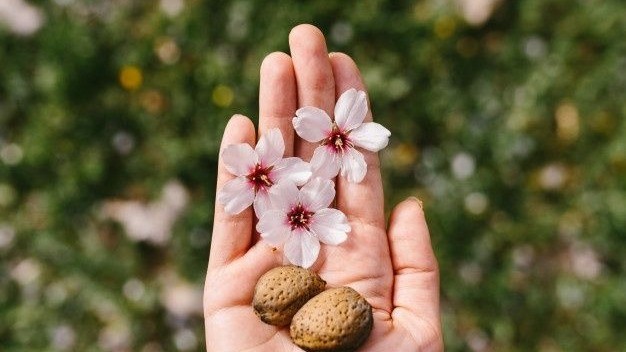“Was this the face that launched a thousand ships?” Christopher Marlowe
The quest for beauty transcends time. While we check the latest skincare innovations, ancient civilisations had already mastered the art of beauty rituals – secrets so powerful the’ve endured for millennia.
The beauty routines of historical icons weren’t just about vanity: they were sophisticated systems of self-care based on deeply observed natural principles.
Cleopatra’s famous milk and honey baths weren’t mere indulgence – they contained lactic acid and humectants now celebrated in modern dermatology. Roman nobility didn’t simply enjoy olive oil massages; they pioneered a practice we now call “oil cleansing” that preserves the skin’s moisture barrier.
But perhaps no civilisation perfected botanical beauty quite like the ancient Greeks.
The Almond: Ancient Greece’s Beauty Superfood
Long before clinical trials and active ingredients, Greek women recognised that almonds possessed extraordinary skin benefits. Archaeological evidence from 5th century BCE shows specialised containers for almonds-based beauty preparations in wealthy Athenian households.
Helen of Troy – whose legendary beauty sparked the Trojan War – would have likely incorporated almonds into her regiment. Greek aristocratic women combined almonds with other Mediterranean botanicals in elaborate beauty rituals passed down through generations.
What they couldn’t explain scientifically, we now understand: almond contain roughly 50% oil rich in oleic acid, linoleic acid, and vitamin E – a powerful natural antioxidant that helps protect skin from oxidative damage.
The Helen of Troy Almond Cleanser: A 3000-Year Old Recipe Reimagined
This ancient-inspired formulation combines ingredients available to Hellenic beauties with proven skin benefits:
✨ 1 tbsp plain Greek yogurt (contains natural lactic acid that dissolves dead skin cells)
✨ 1 tbsp almond butter (delivers concentrated fatty acids and vitamin E)
✨ ½ tsp raw honey (a natural humectant with antibacterial properties)
✨ 3 drops cypress or rose essential oil (optional – for an authentic Greek aromatic experience)
Apply to clean skin with gentle circular motions, allowing the natural enzymes to work for 5-7 minutes before rinsing with lukewarm water.
The Forgotten Ritual
What fascinates historians is how the Greek integrated beauty rituals with social customs. During certain festivals honouring Aphrodite, women would gather to prepare communal beauty treatments while sharing wisdom and stories. The almond was considered sacred to Aphrodite herself – representing both beauty and fertility.
A little known fact: Greek women would collect morning dew from almond blossoms, believing it contained the essence of youth. While poetic, they were unknowingly harvesting natural plant waters containing beneficial polysaccharides!
The most enduring beauty secrets aren’t found in laboratories but in the wisdom of ancient civilisations who understood that true beauty emerges with harmony with nature.
Would you incorporate this Ancient Greek beauty secret into your modern routine?



